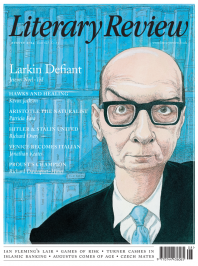Bryan Appleyard
Fascinating Algorithms
Colliding Worlds: How Cutting-Edge Science is Redefining Contemporary Art
By Arthur I Miller
W W Norton 424pp £22
This book may be the only extant publication in which the word ‘electrifying’ and the name C P Snow appear in the same sentence. ‘Tweedy’ maybe, ‘donnish’ certainly, but ‘electrifying’ never.
In fairness, Arthur I Miller, a physicist and historian of science, is not referring to Snow the man but to his 1959 lecture ‘The Two Cultures’. Again, however, electrifying is hardly the word for a rather liverish complaint about how people in the humanities know nothing about science (and, sort of, vice versa). This became for a while ‘an issue’ and Snow’s analysis is still occasionally evoked to describe what is seen as a lamentable intellectual failing.
It wasn’t and it isn’t. For at least 250 years the impact of science on the humanities has been immense and fundamental, though often negative, and, in the last twenty-five or so years (since the publication of Stephen Hawking’s A Brief History of Time), a wave of popular science publishing

Sign Up to our newsletter
Receive free articles, highlights from the archive, news, details of prizes, and much more.@Lit_Review
Follow Literary Review on Twitter
Twitter Feed
It wasn’t until 1825 that Pepys’s diary became available for the first time. How it was eventually decrypted and published is a story of subterfuge and duplicity.
Kate Loveman tells the tale.
Kate Loveman - Publishing Pepys
Kate Loveman: Publishing Pepys
literaryreview.co.uk
Arthur Christopher Benson was a pillar of the Edwardian establishment. He was supremely well connected. As his newly published diaries reveal, he was also riotously indiscreet.
Piers Brendon compares Benson’s journals to others from the 20th century.
Piers Brendon - Land of Dopes & Tories
Piers Brendon: Land of Dopes & Tories - The Benson Diaries: Selections from the Diary of Arthur Christopher Benson by Eamon Duffy & Ronald Hyam (edd)
literaryreview.co.uk
Of the siblings Gwen and Augustus John, it is Augustus who has commanded most attention from collectors and connoisseurs.
Was he really the finer artist, asks Tanya Harrod, or is it time Gwen emerged from her brother’s shadow?
Tanya Harrod - Cut from the Same Canvas
Tanya Harrod: Cut from the Same Canvas - Artists, Siblings, Visionaries: The Lives and Loves of Gwen and Augustus John by Judith Mackrell
literaryreview.co.uk